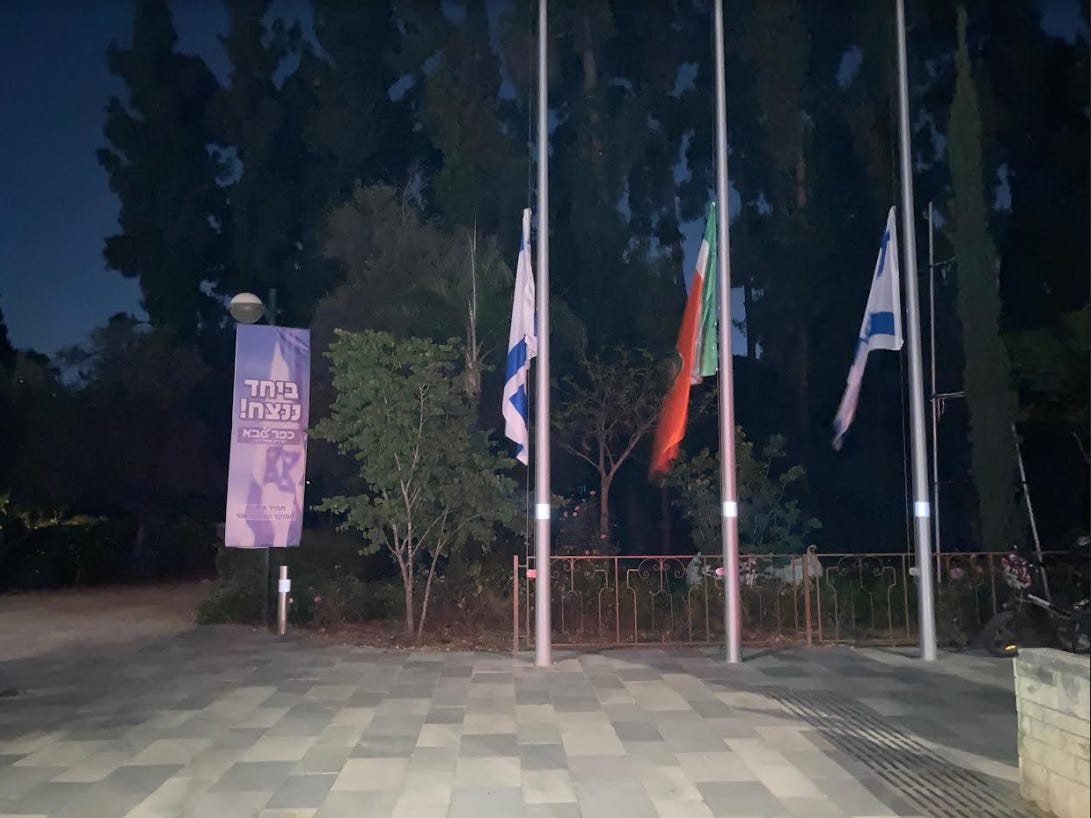There are no Memorial Day sales in Israel. Nor are there three day weekends. There are traffic jams, but those all surround the military cemeteries around the country. If you need to get to one by the 11am siren marking the start of the ceremony, you need to allow yourself time to get there. Parking is impossible so you might have to park on the sidewalks of the streets surrounding the cemeteries. No one will be giving out parking tickets. Trains and busses are free.
We live in Kfar Saba, down the block from the military cemetery. When it was built it was at the edge of town. It was beyond the founder’s imagination that a small farming community could grow to a city of over 100,000. In addition to the graves of the fallen soldiers there is a series of unmarked graves that belonged to a group of Jewish refugees from Tel-Aviv who, during WWI, were exiled from their homes by the Ottoman Turks. They wandered to a young Kfar Saba and drank poisoned water. No one knew their names and the Jews of Kfar Saba buried them.
The Central Synagogue in the city, a large sanctuary that seats about 400 is not one of the more beautiful structures in the country. Although they have daily services and have plenty of people on Shabbat evening and morning no one walks into the synagogue and enjoys the aesthetics of the building. Let’s just say it is rather ugly and neglected. However, on the walls in the front of the sanctuary, are seven marble slabs and the names of all the fallen soldiers from Kfar Saba are inscribed on them along with the date of their birth and death, parent’s names and where they were killed and buried. There are hundreds of names. There is one long marble slab for the Yom Kippur War of 1973. Five more names need to be added from this war.
From the night before Memorial Day (as in all Jewish holidays and memorial days it starts at night) soldiers from the Artillery Division light the memorial flame and stand guard.
In the morning, the children from the elementary schools in the city walk silently down the main street, named after the first President of Israel, Chaim Weizman, past the cemetery to Memorial Park and to the monument commemorating the deaths of the local soldiers. They all wear white shirts. There is a ceremony at the monument.
At 11am the families gather in the cemetery around the graves of their sons, daughters, husbands, wives, fathers, mothers, grandchildren, cousins, friends.
I live on number 5 on a street that is across from the cemetery. A man who grew up in number 3 was killed in the Second Lebanon War in 2006. He was married with children and his parents still live in the apartment. Across the street from us, in building 4 lived Hadar Goldin, an officer who was killed in 2014 in Operation Tzuk Eitan in Gaza. He was killed when the war was supposed to have been over, during a cease fire brokered by President Obama and the UN and eagerly accepted by the Israeli government and army brass. The Prime Minister then was Benjamin Netanyahu, the Defense Minister Moshe Ya’alon and the IDF Chief of Staff was Benny Gantz. In spite of the cease fire, or maybe because of it, Hadar was killed and kidnapped by Hamas into a tunnel. The family has fought since then for his return on humanitarian grounds – for what is more basic in human life than the right to bury one’s son? This right, this need, goes as far back as the Iliad and beyond.
At 11am a siren sounds and no one moves. Then a politician speaks, Kaddish is said by a parent of a fallen soldier, Psalms are read, the El Maleh Rachamim prayer is chanted, wreaths are laid and then there is the 21 gun salute. Three volleys of seven.
The Hatikva, the national anthem, is sung. The ceremony ends.
The families return to their homes and their friends and families visit, and the parents, wives, husbands, sons, daughters, cousins, grandfathers, grandmothers, comrades in arms and friends tell stories of the fallen soldiers and comfort each other.
They are their stories now.
The soldiers guarding the monument and keeping the flame alive stay until sundown. Then Independence Day begins. This year, even though over 600 soldiers have been added to the list of the fallen and 1,500 Israeli’s were killed by the cruel of the cruel, the evil of the evil, there will be celebrations so that the children can enjoy and understand.







No, America's Memorial Day could never be like that. The nearest comparison I can make is the day that the Vietnam Veterans Memorial was officially dedicated in Washington DC: November 13, 1982. I was serving in the Army Reserve back then and my section chief, like me, was a Vietnam veteran. His brother lived in DC and could put us up, so Paul and I drove down from Indiana to be there for the dedication. As serving soldiers, we wore our green service uniforms. Thousands of our fellow veterans were there; I suppose I shook two or three hundred hands. President Reagan gave the keynote address. I still get a lump in my throat when I recall those few hours. It was a once-in-a-lifetime experience. But in Israel, it happens every year.
This year everyone is observing a particularly somber Memorial Day. Who would have thought that seven months following 10/7, over 100 captives would still be held by the Gazans, fighting would rage in Jabaliya & rockets would continue to strike the north. Please excuse my resemblance to Sen. Schumer as I too call for new Israeli leadership during this very difficult time.